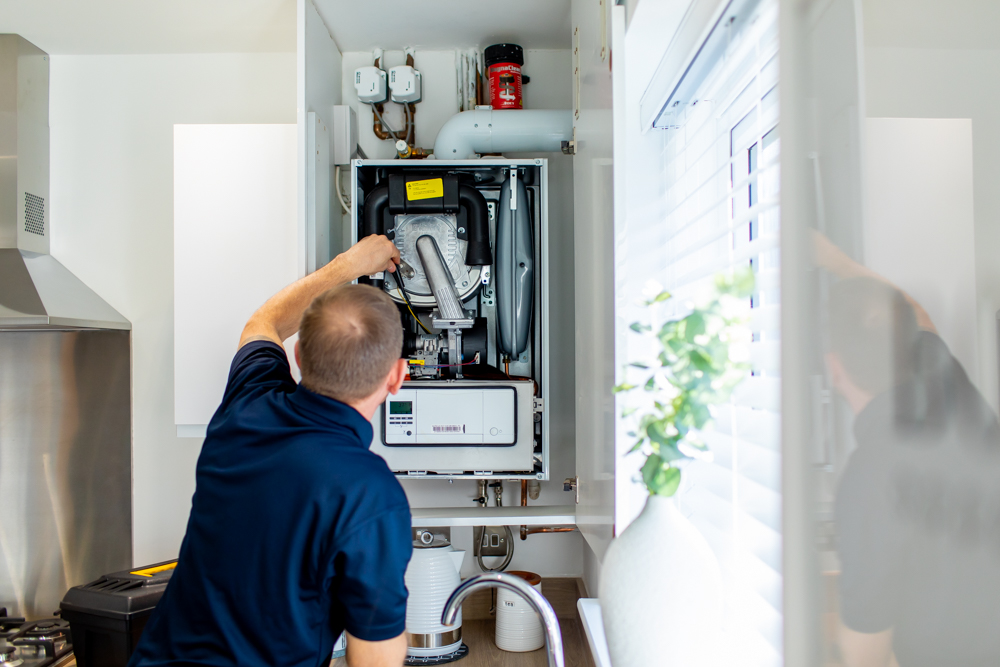As the weather turns colder it’s important you stay warm and safe during the winter months. By following these simple tips, you can keep one step ahead of the bad weather!
Click on our drop down below to get started:
-
 Pipes freezing can affect your boiler. Simply run warm, not boiling, water down the condense pipe.
Pipes freezing can affect your boiler. Simply run warm, not boiling, water down the condense pipe.A condensate pipe carries condensation from your boiler to your outside drain. It’s usually a white or grey plastic pipe that travels from your boiler through the wall directly outside where your boiler is located.
During cold weather, the condensation in this pipe may freeze and cause a blockage causing the condensation to back up into the boiler and cause it to shut down.
-
Our advice is to open taps and heat the pipe slowly with a hair dryer. Don’t overheat the pipe or use boiling water as this will cause the copper to burst.
-
Please follow this winter guidance because if your garden tap bursts due to being frozen, we won’t repair it.
It’s harder for running water to freeze so open the tap and leave it to thaw naturally but make sure you turn off the inside tap that controls the garden tap first.
Also, be careful you don’t slip on any water from the tap that may have frozen on the ground.
-
During cold snaps some pipes burst. Pipes might be split for several hours or days before you notice. As the water freezes it expands which can fracture the pipes, then as it thaws this results in the leak / burst. You can reduce the risk by making sure your property is heated.

Find your stopcock
Do you know where your home’s stopcock is? You should find out where it is and check it regularly to make sure you can turn it off easily in an emergency. They are usually in the kitchen but if you’re unable to locate yours, get in touch with us.
You may find it helpful to label your stopcock, so you can easily locate it if you’re in a panic. If you’re away from home for a while, turn off your water supply at the stopcock and run all your taps until all the water contained in the system is removed, then turn off the taps. When you return turn your stopcock back on.
You may find it helpful to label your stopcock, so you can easily locate it if you’re in a panic. If you’re away from home for a while, turn off your water supply at the stopcock and run all your taps until all the water contained in the system is removed, then turn off the taps. When you return turn your stopcock back on.
-
When paths / walkways become frozen, you can either buy grit yourself or use table salt to melt the ice. Be careful you don’t slip on ice as many accidents caused in the winter are due to people slipping on ice. DON’T pour hot water over the affected area as this will cause it to freeze again, but even quicker.
Annual Gas Safety
Every year we check that your gas boiler and any other gas appliances in your home are working correctly. This essential check helps us keep you, your family and neighbours safe.
This check is mandatory so it’s important that you let us know if you’re not available for your appointment so we can rearrange it for you.
During the appointment we check all the gas appliances we have provided. Gas appliances that have not been properly installed, are faulty or poorly maintained can cause gas leaks, explosions and carbon monoxide poisoning.
We also do spot checks of our work. After your annual gas safety check, gas repair or new boiler installation you may get a visit from a qualified inspector. They will carry out a quality assurance inspection of the work to help make sure our services are of a high standard.
If an old gas oven or hob needs to be removed or disconnected it’s important that this is only carried out by a suitably competent Gas Safe registered engineer. There’s a danger of a gas leak if the work is done incorrectly.
If you’re in a Shared Ownership home, it’s your responsibility to arrange and pay for your annual gas servicing.

Did you know?
Around 100 fires a year are caused by faulty electric blankets and in England alone, around 7,600 chimney fires occur every year!
Safety with open fires
- Be careful when using open fires to keep warm. Make sure you always use a fire guard to protect against flying sparks from hot embers.
- Make sure embers are under control and properly put out before you go to bed.
- Keep chimneys and flues clean and well maintained. We provide an annual chimney cleaning service to our customers free of charge. Please contact us for more information.
Using portable heaters
- Keep heaters away from curtains and furniture and never use them for drying clothes.
- Always unplug electric heaters when you go out or go to bed.
- Try to secure heaters against a wall to stop them falling over.
- We do not recommend that you use gas or paraffin heaters in your home. If you do use one, make sure it’s in a well-ventilated area. Heaters consume oxygen so you could suffocate if a room is not properly aired.
Using electric blankets bottles
- Unplug blankets before you get into bed unless they have a thermostat control for safe all-night use.
- Store electric blankets flat, rolled up or loosely folded to prevent damaging the internal wiring.
- Test electric blankets every 3 years. Age UK or your local fire and rescue service may be able to do this for you.
- Regularly check your blanket for wear and tear and replace it when it’s more than ten years old.
- Don’t buy second-hand blankets as they could be unsafe.
- When buying a new electric blanket, look for the following symbols which show it’s safe to use:



If the electricity fails – don’t forget!
• If you use candles or matches, always take special care. Put them out completely before leaving the room or going to bed.
• Use a snuffer or a spoon to put out candles. It’s safer than blowing them out when sparks can fly.
• Make sure candles are secured in a proper holder and away from materials that may catch fire – like curtains.
• Keep a fully charged mobile phone handy so you can still make an emergency call if there is a power cut.



 Pipes freezing can affect your boiler. Simply run warm, not boiling, water down the condense pipe.
Pipes freezing can affect your boiler. Simply run warm, not boiling, water down the condense pipe.